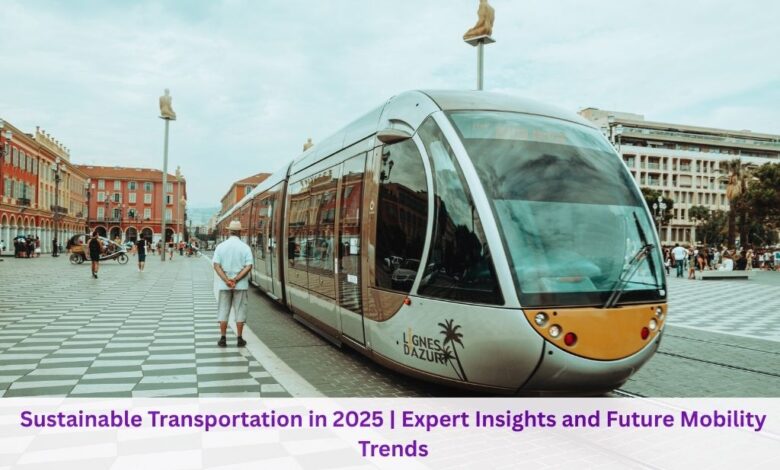Sustainable Transportation in 2025 | Expert Insights and Future Mobility Trends

Sustainable transportation is one of the most widely discussed topics in the world today, with Google search trends showing consistent interest in keywords like electric cars, public transportation solutions, eco-friendly mobility, carbon footprint reduction, and green energy in transport.
The urgency of climate change, rising fuel prices, and growing urbanization are pushing people and governments to rethink how we move from one place to another. Expert interviews reveal that transportation is no longer only about convenience and speed; it is now about reducing emissions, embracing innovation, and building systems that serve both people and the planet.
When people search for sustainable transportation, the first keyword that frequently appears is electric vehicles. According to experts, EV relinquishment has increased significantly because consumers want to cut energy costs while contributing to cleaner air.
Electric buses , electric bikes, and indeed electric motorcars are gaining fashion ability worldwide. Google searches for stylish electric buses 2025 and affordable EVs are trending, proving how the request is shifting from luxury electric vehicles to accessible models for everyday commuters. Experts punctuate that battery technology is perfecting at a rapid-fire pace, and range anxiety, which was formerly the biggest hedge, is sluggishly fading as charging structure expands. Another keyword gaining attention is public transport results.
Experts believe that no matter how advanced private buses come, the future of sustainable transportation depends heavily on mass conveyance systems. quests foreco-friendly motorcars, high- speed trains, and smart metro systems show how people want briskly, cleaner, and more dependable options in civic centres. Expert interviews suggest that sustainable public transport is not only about replacing diesel motorcars with electric bones but also about designing networks that are accessible, affordable, and inclusive for all. metropolises like Amsterdam, Singapore, and Oslo are formerly leading by illustration, introducing green motorcars, waggoneer systems, and integrated cycling paths that reduce traffic and emigrations.
Civic mobility is another expression rising in Google quests, frequently linked to keywords like smart metropolises and participated transportation. Experts explain that civic transportation is witnessing a revolution, with lift- participating apse-scooters, bike settlements, and carpooling results getting mainstream. Expert interviews suggest that people are no longer interested in retaining a auto as much as they formerly were; rather, they prefer on- demand mobility services that save plutocrat and reduce environmental impact. Shared mobility, according to experts, also aligns with the conception of the indirect frugality, where coffers are maximized rather than wasted.
Green energy in transportation is another trending hunt, as people explore how renewable sources like solar, wind, and hydrogen can power mobility. Expert interviews reveal that hydrogen- powered vehicles are especially promising for heavy diligence and long- haul transport, where batteries may not always be effective. Google hunt data shows rising interest in hydrogen motorcars and hydrogen energy cell buses , indicating that people are laboriously curious about druthers beyond electric.
Experts agree that a blend of energy sources electricity, hydrogen, and biofuels will define the future of sustainable mobility rather than counting on one single technology. Cycling is another area passing renewed global interest. Google searches for bike-friendly metropolises, cycling to work, and eco commuting are trending in 2025. Experts suggest that cycling is not only a healthy form of transport but also one of the most sustainable.
Expert interviews emphasize the significance of megacity planning, where safe cycling lanes and bike- participating systems encourage people to leave their buses at home. Copenhagen and Amsterdam are leading exemplifications, where cycling is a way of life, supported by structure that makes it both safe and accessible. The keyword smart transportation is also dominating trends, as technology continues to review how we travel. Experts canvassed highlight the part of artificial intelligence, data analysis, and smart detectors in managing business, prognosticating trip demand, and reducing traffic.
Autonomous vehicles are another popular hunt, with people curious about how tone- driving buses might change mobility. Experts suggest that while completely independent buses may take times to come mainstream, semi-autonomous features are formerly perfecting road safety and effectiveness. Smart business lights, AI- driven logistics, and connected vehicles are shaping the transportation geography in real- time. Sustainability in aeronautics is another area gaining instigation, with Google quests showing rising interest in green air trip, electric aeroplanes , and biofuel- powered breakouts.
Experts admit that aeronautics is one of the hardest sectors to decarbonize, but inventions in feather light aircraft accoutrements , biofuels, and mongrel aeroplanes are showing pledge. Some airlines are formerly investing in carbon neutralize programs and testing new propulsion systems that could reduce emigrations significantly. Expert interviews reveal that while mass relinquishment of electric aeroplanes
Experts emphasize that the transportation sector is one of the largest contributors to global emigrations, and transitioning to greener systems is not negotiable. Expert interviews also reveal that while individual choices like cycling or choosing public transport matter, large- scale policy changes and commercial responsibility are inversely critical. Experts agree that the future of sustainable transportation depends on collaboration between governments, businesses, and individualities. Google trends show a steady rise in quests for green mobility programs, eco transport impulses, and global climate commitments. Countries that prioritize renewable structure, subventions for electric vehicles, and investments in public transport will lead the way.
Expert interviews conclude that invention, consumer demand, and political will are the three pillars that will shape transportation in the coming decades. In substance, sustainable transportation is further than a buzzword. It’s about creating a future where trip is effective, inclusive, and environmentally friendly. From electric buses to participated mobility, from cycling to hydrogen- powered freight, every invention is bringing the world closer to carbon impartiality. Google trending keywords reflect this shift in public knowledge, while expert interviews show the determination of diligence to acclimatize. The trip toward sustainable transportation is ongoing, but one thing is clear the choices made moment will define how we move hereafter.
Sustainable transportation in 2025 is no longer a futuristic vision it’s a fleetly evolving reality shaped by invention, policy changes, and consumer demand for greener druthers metropolises around the world are redefining mobility, shifting from auto- centric designs to people-focused ecosystems. The rise of electric vehicles( EVs), participated mobility, and intelligent public conveyance systems has readdressed how people move, while also setting new marks for reducing carbon emigrations. According to experts, the crucial trends driving the future of mobility include electrification, digital integration, and renewable- powered structure, all working together to achieve climate pretensions and effective civic living.
One of the most significant developments in 2025 is the mainstream relinquishment of EVs, powered by advanced batteries that give longer range and briskly charging. Governments are offering impulses, while charging networks are expanding fleetly, making EV power more accessible. Assiduity leaders believe the coming big advance will be in solid- state batteries, which promise indeed lesser effectiveness and sustainability. Beyond buses , electrification is transubstantiating motorcars, exchanges, and indeed aeronautics, motioning a broader shift across all modes of transport. At the same time, participated mobility platforms similar as-scooters-bikes, and ride- hailing services are playing a pivotal part in reducing traffic and pollution in civic centres. Experts punctuate that micro-mobility results are bridging the “ last- afar gap, ” encouraging people to calculate less on private buses .
This transition is also supported by smart megacity technologies, including real- time business operation, AI- powered route optimization, and integrated mobility apps that allow commuters to plan, book, and pay for multiple transport modes through a single platform. Hydrogen energy cells are also gaining attention in 2025, especially for heavy- duty transport like exchanges and vessels, where battery results remain limited. Experts see hydrogen as a reciprocal result to electrification, offering clean energy for long- haul peregrinations. Combined with renewable energy sources similar as solar and wind, hydrogen mobility has the implicit to significantly reduce reliance on fossil energies. Another important aspect shaping sustainable transportation is policy.
Governments are introducing stricter emigrations regulations, low- emigration zones, and green impulses for businesses that borrow Eco-friendly logistics. These programs are encouraging companies to switch to electric delivery vans, drones, and independent vehicles to meet both environmental norms and client prospects for briskly, cleaner deliveries. The future of mobility in 2025 is not just about vehicles it’s about erecting connected ecosystems that balance effectiveness, sustainability, and availability. Expert perceptivity suggest that the coming decade will see indeed more integration between mobility, renewable energy, and digital structure, leading to cleaner air, smarter metropolises, and a better quality of life.
Experts explain that micro-mobility offers results for the last afar problem, helping people travel short distances without counting on buses or motorcars. Expert interviews emphasize that micro-mobility also reduces business traffic, particularly in crowded metropolises, and works best when integrated with public transport systems. The social side of sustainable transportation is inversely important, with keywords like availability, equity in transport, and inclusive mobility appearing in quests. Experts argue that a sustainable transport system must serve not just the fat but also marginalized communities, the senior, and people with disabilities. Expert interviews punctuate that transportation is a introductory mortal right, and any green mobility plan must include affordability and inclusivity. Sustainable results should thus concentrate not only on technology but also on fairness and access.
Climate change continues to be the biggest motorist behind sustainable transportation. Google searches for reducing carbon footmark and climate-friendly mobility show how consumers are getting more Eco-conscious. Experts emphasize that the transportation sector is one of the largest contributors to global emigrations, and transitioning to greener systems icon-negotiable. Expert interviews also reveal that while individual choices like cycling or choosing public transport matter, large- scale policy changes and commercial responsibility are inversely critical. Experts agree that the future of sustainable transportation depends on collaboration between governments, businesses, and individualities.
Google trends show a steady rise in quests for green mobility programs, eco transport impulses, and global climate commitments. Countries that prioritize renewable structure, subventions for electric vehicles, and investments in public transport will lead the way. Expert interviews conclude that invention, consumer demand, and political will are the three pillars that will shape transportation in the coming decades. In substance, sustainable transportation is further than a buzzword. It’s about creating a future where trip is effective, inclusive, and environmentally friendly.
From electric buses to participated mobility, from cycling to hydrogen- powered freight, every invention is bringing the world closer to carbon impartiality. Google trending keywords reflect this shift in public knowledge, while expert interviews show the determination of diligence to acclimatize. The trip toward sustainable transportation is ongoing, but one thing is clear the choices made moment will define how we move hereafter.




